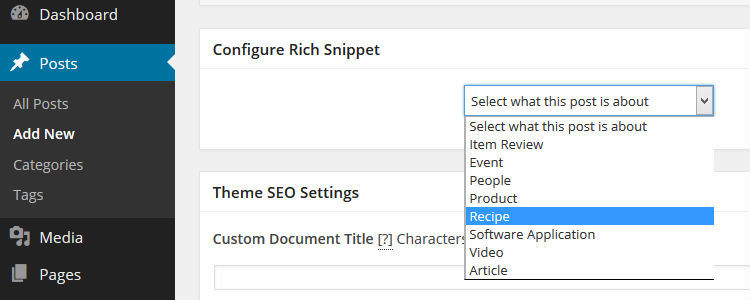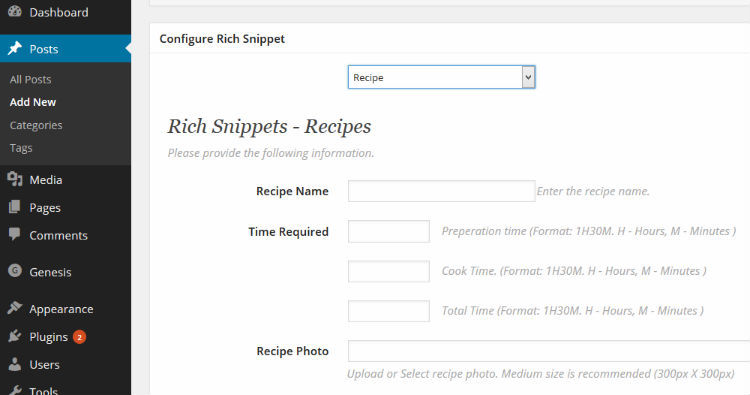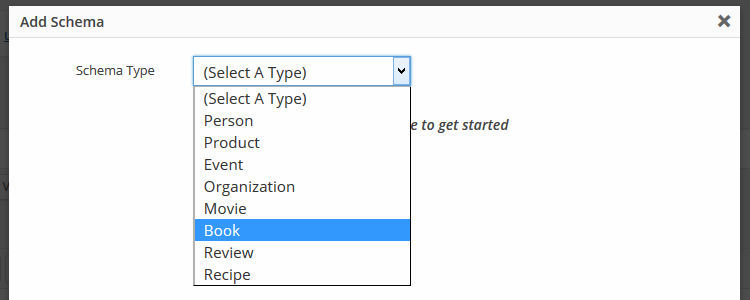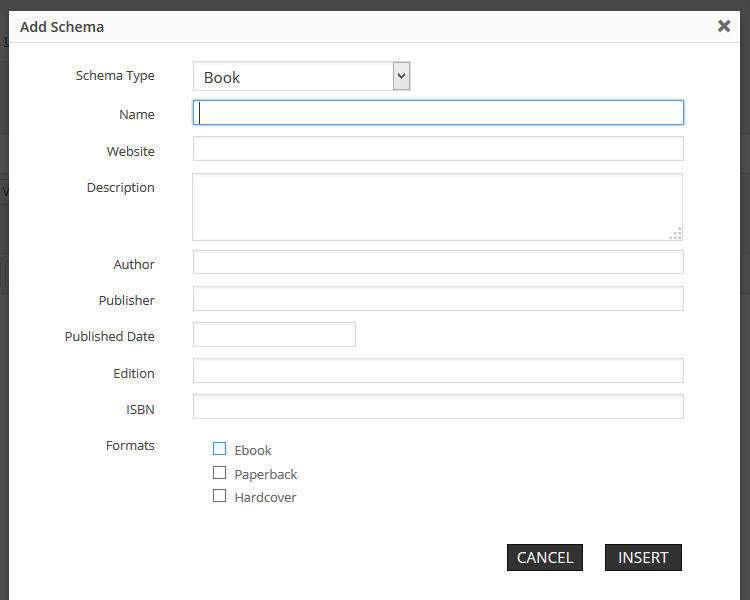How to add Google Rich Snippets in WordPress

In the fiercely competitive online environment, you should be looking to use every tool at your disposal to your advantage. One “tool” that is shockingly under-utilized is Google’s rich snippets feature. You’re probably familiar with rich snippets: they’re the extra “snippets” of information that sit alongside some results in the SERPs. Why do they matter? Well, for a start, they make your page stand out from the competition, meaning they are a proven way to boost your CTR and increase your traffic from the search engines.

Despite the obvious benefits, only 0.3% of websites make use of rich snippets. Read that again: 0.3%. Of course, this figure is the average of all websites on the Internet, and is likely to be significantly higher in more technical niches, but it’s still an area that plenty of webmasters are failing to take advantage of. Today I’m going to show you how to install rich snippets on your website in the simplest manner possible: using a WordPress plugin.
Now, Google doesn’t just pull the rich snippets extracts directly from your content. Instead, it needs users to insert microdata to help it understand the nature of your content. It can then convert this microdata into the information displayed in the rich snippets. Inserting this microdata manually can get quite technical (see schema.org for more details); using a plugin just streamlines the whole process.
There are a number of free plugins available to help you install the rich snippets function on your website. With a number of rich snippet types–including authorship, events, review and recipe snippets–some plugins focus on one specific type of rich snippet, while there are also a few “all in one” style plugins. I’ve picked out a both types, to help you find the best plugin for your needs.
All in One Schema.org Rich Snippets
All in One Schema.org Rich Snippets plugin is one of the best all-in-one rich snippet plugins available, in my opinion. It automatically inserts the schema microdata into each post, which Google can translate into rich snippets. It supports a wide range of rich snippet types, including: authorship, events, people, personal review, product, recipe, software reviews & videos.
The number of snippets supported is to be expanded in future updates, with book reviews and local business snippets penciled in. The plugin’s simplicity is its strong point. Underneath your text editor you’ll find a metabox, with a small drop-down menu with all the different snippet types the plugin supports.

After you’ve selected the most suitable option, you’ll see a number of fields to fill in, depending on your first selection. For example, a recipe snippet will require an estimated cooking duration, while the authorship snippet will need the author’s name.

When you’re done, hit publish as usual and Google will be able to recognize the microdata and use this to populate the rich snippets next to your link in the SERPs. Clean, quick and easy!
Schema Creator by Raven
The Schema Creator plugin is very similar to the All in One plugin: essentially, it adds schema microdata to your posts. However, it uses a slightly different process, and support a different range of rich snippet types: book, event, movie, organization, person, product, recipe, review, etc.
The main difference is the addition of the book, movie and organization snippets, so if you run a local business website, or one dedicated to movies or books, this plugin would be more suitable for your needs. To add the microdata, the plugin adds an extra button above the visual editor, labelled Add Schema. This brings up a lightbox with a simple drop-down menu.

Selecting the snippets type you want will bring up some additional fields, which you can fill in. There are a lot more fields included when compared with the All in One Schema.org Rich Snippets plugin, allowing you to attach far more detailed excerpts to each post. Although not all fields will appear in the rich snippets at once–there’s far too many–it allows you to provide more detail to the search engines about your post, and this can only be a good thing.

When you’re done filling in your information, hit Insert and this will place a shortcode into the visual editor. Hit publish when you’re ready, and this will add the schema microdata to your post.
Rich Contact Widget
If you’re looking to drive more traffic to your business or personal website, the Rich Contact Widget plugin could be what you’re looking for. I consider this to be more of a specialist plugin, as it has far less versatility than our first two plugins. Rich Contact Widget only supports a very specific type of rich snippets: individual and local organizations. It also only offers a site-wide rich snippet, rather than one customized for each individual post.
The plugin allows you to create a contact widget, which can be placed in your sidebar. This lets you include information including your name, telephone number, address and type of business–there are tons to choose from, from animal shelter to nightclub, from casino to tattoo parlor. This creates a nice looking contact box–a useful feature in itself.
However, the real benefit of this plugin is that the contact details you input are also converted into microdata for the search engines. This means your business’ contact detail will be included alongside your search listing as a rich snippet. This is very useful if you have a primarily local customer base.
AuthorSure
If you’re a blogger, Google has created a rich snippet specifically for you: the authorship snippet. The AuthorSure plugin makes it easy to claim your authorship snippet, whether you’re a one-man show or running a multi-author blog. AuthorSure makes it easy to create an author box at the bottom of each post, complete with bio, profile and social links. A drop down menu allows you to easily select the author of an individual piece.
The best part: all author information is also inserted as microdata, telling the search engines who the author of the article is, which it then displays as a rich snippet in the SERPs. All you need to do is input your Google+ details on your WordPress user profile page, and you’re good to go.
Yet Another Stars Rating (YASR)
Have you ever noticed the star rating snippets included in the SERPs? If not, see the screenshot above to see what I’m talking about. YASR is an awesome plugin that allows you to add this feature to your rich snippets. All star ratings can be displayed on your website, but they are also indexed as microdata, allowing the search engines to understand them.
You can use this plugin in two different ways: to provide your own rating, or to collate ratings from your user-base. If you review products or services regularly from your blog, this first option will be very useful. Not only does the YASR plugin allow you to insert a review box into your post, it also communicates your rating to the search engines, which can be displayed in the SERPs alongside your name and the product/service you’re reviewing.
The second option allows you to collect ratings from your users, which it then collates to give an average user rating. This too can be displayed in your post, and also in your rich snippets. This is particularly handy for local businesses, who can ask users to review their service, which it can then display in the SERPs. The benefit is obvious: is a user more likely to click on a restaurant rated 5 stars by its diners, or a restaurant with no rating at all? The former, of course. Beyond this, you can also use this plugin to let your users review a specific article, or to cast their opinion on a product or service you’ve reviewed.
Wrapping Up
With a number of useful rich snippets plugins out there, adding rich snippets to your search listing is a simple process. If you’re looking for a quick and easy solution to increase your traffic figures, taking advantage of rich snippets is a good place to start. If you have any thoughts on rich snippets, let us know in the comments section below!








Thanks for mentioning my plugin ! I hope it’ll be useful for anyone looking for a simple, but “rich” contact widget for their website
Thank you! You made it easier to understand how these plugins work.
The Premium SEO plugin by AA Team is also great it has many features and supports rich snippets.
I’m use WordPress Social Sharing Optimization (WPSSO) Pro Version gives me control over the information for Facebook, Google+, Twitter, Pinterest, LinkedIn, StumbleUpon, Tumblr and etc. Its integrated well to my WooCommerce site, WordPress SEO Plugins, detect images & videos for your social sharing.
Great article in a very little known category, thanks.
Thanks for the great article Shaun! Do you know if it possible to change your rich snippets? A couple of weeks ago I started to rank nr 2 for a very competitive keyword in Sweden and because of that (well it has to be) I got four rich snippet links to landing pages on my domain.
The thing is that Google choosed the four rich snippet links and even though I believe it’s improving my CTR from the serp I think it would improve even more if I was able to choose wich rich snippet links to show.
Hi Arim, you can actually choose to remove (demote) the sitelinks if you don’t like them via Google Webmasters.
YASR is seems excellent and meet with our requirement.
Thanks for sharing this informative stuff.
Can I use All in One Schema.org Rich Snippets and YARS at the same time without making a conflict with the code ?
Very helpfull ! Thank’s for share.
I find it extremely hard to find information in the web conserning the editing of pre-existing structured data. Due to the fact that my copany’s website is related to health and beauty (organization -> local business I suppose) created with WordPress, I tried the Raven plugin as instructed above, followed the steps above but in the end what I typed was seen online on the website.
It’s really sad that almost all rich edit (microdata) plugin designers don’t have a clue how rich snippets should be used. Most of them add horrible formatted text (the attribute values) straight into your well designed text. None of them seems to realize that the idea is to add invisible markup to existing text, explaining to search engines ONLY what the text is about.
Thank you for helping to take the guess work (and trial and error) of finding the right plug-in. I really wish there was an all-inclusive plug-in (posts and pages, with all schema types) that had an easy to use interface. Here’s to hoping!
YASR will show the star as microdata?? i have used kk star rating but it doesn’t show
Agreed..I’ve tried a few and they all do that. They don’t seem to understand it’s semantic language (for search engines not users) and one plugin’s help page linked to a bit on a Google Webmaster guide page which they (apparently) are misunderstanding. Basically what the rule says is “don’t markup content and hide it (with css rules etc.) in other words if (the event or item or whatever)is not part of your text don’t put there to markup only to hide it from users-basically the same idea as the old “putting white text on a white background to “keyword-stuff”. It does not mean your marked up text has to be summarized or presented to the user that way.
If you use the “data highlighter” in Google Webmaster Tools to mark up text it makes no mention of these “summary boxes” nor does it create them when you click “generate HTML” when you use the data highlighter tool. Pretty sure if those “boxes” were necessary then the tools in GWT would create them. Looks like I’ll just have to wait til the posts get indexed and then use the highlighter in GWT.
Google Rich Snippets is very good way to attract visitors and enhance CTR rates, thanks for the guide
Hi
If we switch our WordPress website to SSL or HTTPS do we get the star ratings intact in Google SERP ?
SSL/HTTPS shouldn’t affect your star ratings if they’re already showing. Google uses these guidelines to determine if your site is eligible for ratings/reviews, so as long as you are following those rules and have your rich snippets setup correctly you should still be a good candidate for your ratings to be displayed.
i think all in one schema.org rich snippet plugin is good
I installed All in one Seo Rich Snippets and configured for few pages. But the schema is showing in the pages itself.. Why it’s happening..?
This could happen if there is some broken HTML on the site or a bug in the plugin. Did you try reaching out to the plugin developer? You may have to share the URL with them so they can actually see what’s going on though to offer help.
I guess Bijo refers to the html box placed on the page by the plugin. This is mandatory as hidden snippet elements are not taken into account by Google. That box is quite ugly though..
Yes that plugin is good I’m also using WooCommerce Rich Snippets and Schema Markup plugin which is really good for my website and I’m quite happy about it.
I’ve been wondering how to do the rich snippets for so long. I’ve seen it mentioned in Google but couldn’t understand how to do the codes and where to place them. I’m definitely adding one of these to the site. Thanks for the post.